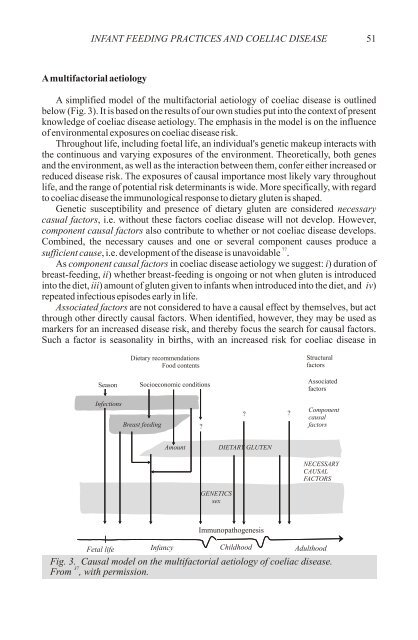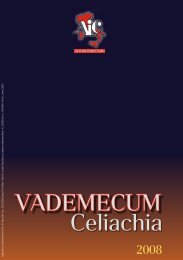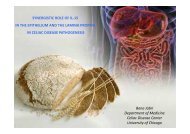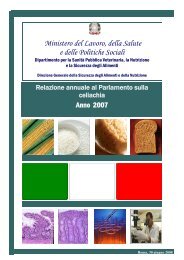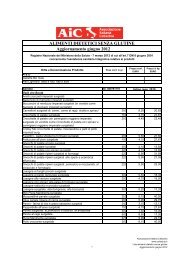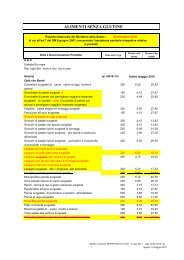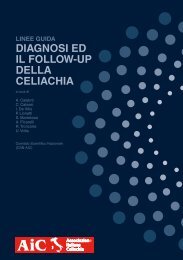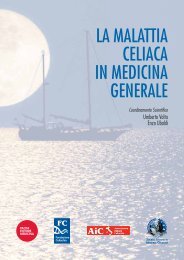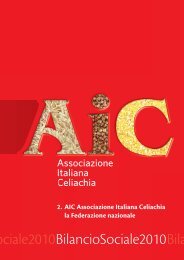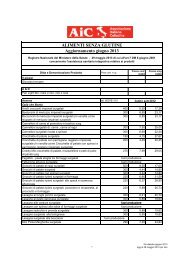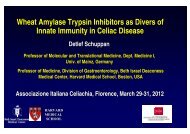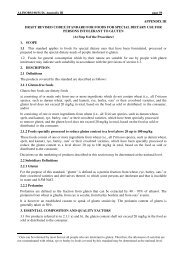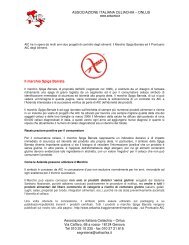primary prevention of coeliac disease - Associazione Italiana ...
primary prevention of coeliac disease - Associazione Italiana ...
primary prevention of coeliac disease - Associazione Italiana ...
You also want an ePaper? Increase the reach of your titles
YUMPU automatically turns print PDFs into web optimized ePapers that Google loves.
INFANT FEEDING PRACTICES AND COELIAC DISEASE<br />
51<br />
A multifactorial aetiology<br />
A simplified model <strong>of</strong> the multifactorial aetiology <strong>of</strong> <strong>coeliac</strong> <strong>disease</strong> is outlined<br />
below (Fig. 3). It is based on the results <strong>of</strong> our own studies put into the context <strong>of</strong> present<br />
knowledge <strong>of</strong> <strong>coeliac</strong> <strong>disease</strong> aetiology. The emphasis in the model is on the influence<br />
<strong>of</strong> environmental exposures on <strong>coeliac</strong> <strong>disease</strong> risk.<br />
Throughout life, including foetal life, an individual's genetic makeup interacts with<br />
the continuous and varying exposures <strong>of</strong> the environment. Theoretically, both genes<br />
and the environment, as well as the interaction between them, confer either increased or<br />
reduced <strong>disease</strong> risk. The exposures <strong>of</strong> causal importance most likely vary throughout<br />
life, and the range <strong>of</strong> potential risk determinants is wide. More specifically, with regard<br />
to <strong>coeliac</strong> <strong>disease</strong> the immunological response to dietary gluten is shaped.<br />
Genetic susceptibility and presence <strong>of</strong> dietary gluten are considered necessary<br />
casual factors, i.e. without these factors <strong>coeliac</strong> <strong>disease</strong> will not develop. However,<br />
component causal factors also contribute to whether or not <strong>coeliac</strong> <strong>disease</strong> develops.<br />
Combined, the necessary causes and one or several component causes produce a<br />
77<br />
sufficient cause, i.e. development <strong>of</strong> the <strong>disease</strong> is unavoidable .<br />
As component causal factors in <strong>coeliac</strong> <strong>disease</strong> aetiology we suggest: i) duration <strong>of</strong><br />
breast-feeding, ii) whether breast-feeding is ongoing or not when gluten is introduced<br />
into the diet, iii) amount <strong>of</strong> gluten given to infants when introduced into the diet, and iv)<br />
repeated infectious episodes early in life.<br />
Associated factors are not considered to have a causal effect by themselves, but act<br />
through other directly causal factors. When identified, however, they may be used as<br />
markers for an increased <strong>disease</strong> risk, and thereby focus the search for causal factors.<br />
Such a factor is seasonality in births, with an increased risk for <strong>coeliac</strong> <strong>disease</strong> in<br />
Season<br />
Dietary recommendations<br />
Food contents<br />
Socioeconomic conditions<br />
Structural<br />
factors<br />
Associated<br />
factors<br />
Infections<br />
Breast feeding<br />
?<br />
?<br />
?<br />
Component<br />
causal<br />
factors<br />
Amount<br />
DIETARY GLUTEN<br />
NECESSARY<br />
CAUSAL<br />
FACTORS<br />
GENETICS<br />
sex<br />
Immunopathogenesis<br />
Fetal life Infancy Childhood Adulthood<br />
Fig. 3. Causal model on the multifactorial aetiology <strong>of</strong> <strong>coeliac</strong> <strong>disease</strong>.<br />
37<br />
From , with permission.


